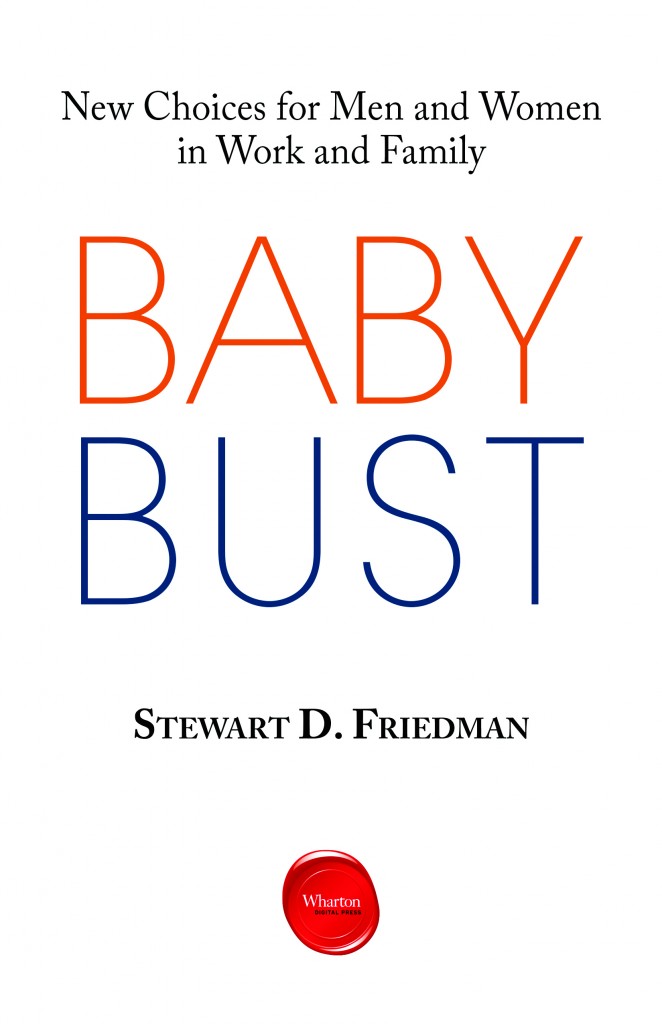According to the recently released book, Baby Bust: New Choices for Men and Women in Work and Family by Stewart Friedman, it summarizes a cross-generational study of college students that produced a “stark discovery: the rate of graduates who plan to have children has dropped by nearly half over the past 20 years.”
In tracking the childfree choice since the late 90s this is the first study I’ve seen of this kind. The study was conducted by the Wharton Work/Life Integration Project at the Wharton School at the University of Pennsylvania. It surveyed 496 members of the 1992 Wharton undergraduate class, then surveyed 307 of the 2012 graduating class.
Some highlights of results:
- In response to the question, Do you plan to have children?:
-In 1992, 79% of women said yes, 12% said probably, and 3% said probably not or no;
-In 2012, 41% of women said yes, 14% said probably, and 27% said probably not or no
-In 1992, 78% of men said yes, 9% said probably, 6% said probably not or no
-In 2012, 42% of men said yes, 12% said probably, 30% said probably not or no
Talk about a drop!
- “The baby bust, in short, is not about young people forming smaller nuclear families, that is, with fewer children. It is about many who say they are simply opting out of parenthood altogether.”
- “Being a parent is still very important for most young people, but many just don’t see how they can manage it, so they are planning to live without children.”
- “ …for Millennials, being a man is no longer inextricably linked to being a breadwinner father, and being a woman is no longer synonymous with motherhood.”
- “..young women who expected their jobs in 10 years in the future to provide the chance to serve others were significantly less likely to plan to become mothers.”
- “Social consciousness now competes with motherhood: making a contribution to the world has become an increasingly common means for women to achieve a sense of meaning and purpose.”
- In 1992…“helping others meant being a mother.” By 2012 young women feel “less constrained by the societal expectation that to be a good, caring and nurturing woman means one has to bear and care for one’s own children.”
- Friedman states that both generations of women are nurturers, but today the nature of that nurturing is “taking different forms.”
- Men in both samples who wanted to make a social impact anticipating doing so in part by rearing the next generation.
- There is a changing tide to seeing parenthood as the selfish choice, and the reality that “women are increasingly focusing on social involvement through achievement of goals other than the pursuit of children.” A desire and value on helping others does not automatically mean motherhood; it “means generating social impact through a successful career.”
- The baby bust is in part an indication that the Millennial respondents are seeing they have the “freedom to choose.”
- There is progress regarding redefining family: Friedman writes the Millennial respondents see “having a family and being a parent are no longer synonymous.”
Observations
Overall Friedman seems to conclude that most young people value parenthood but this does not mean they think they will actually become parents. They see a variety of things getting in the way, like career priority, debt and other financial considerations.
I took a look at the survey items, and for those who said they don’t plan to become parents or think they probably won’t become them, in both groups respondents were not given a chance to answer questions directly related to their level of desire to become parents. For example, if they had little debt, would they plan to have them? Under what circumstances might they change their mind and why? What percentage of the “probably not” and “no” respondents would say it just boiled down to a lack of desire to parent?
I am also left wondering about those who responded they don’t value parenting or rate it as important – why do they think so?
The surveys and findings seem to focus on examining the various social and societal factors that get in the way of parenthood, and not an equal examination of when these factors don’t matter.
The discussion on how we are all part of the “work/life revolution” also takes a parenthood-biased view. When referring to “life” the discussion essentially means parenthood.
A parenthood biased view is also seen through Friedman’s view on population: “There are few imperatives on which I don’t think many will disagree: We need to continue replacing the human population, and children will still need caretakers to lovingly attend to them, educate them, and support them…” There are many experts who would disagree that replacement is not the solution to population growth and overpopulation!
While the 2012 group reveal that both genders are not as bound by traditional gender roles and norms and seem “better prepared to forge their own paths,” the work/life strategies he lays out for the future focus on a baby priority future, including “world class childcare” and “making family leave available.” In keeping with the shifting of norms this discussion should include treating people with and without children equally in the workplace. Things like “family leave” should shift to Personal Time Off (PTO) policies, not policies that automatically favor parents and children.
Friedman does suggest primary and secondary educational strategies to “teach people how to lead their lives” and “ways to discover who they really want to be” and in college have more courses that help students examine “what success means to them” so the will make more informed choices in their lives. An important part of this education is parenthood education, starting with the fact that it is optional- it is just as legitimate of a choice as choosing parenthood. It should not only include the realities of parenthood but examination of themselves and their level of desire, readiness, and what they need in order to become ready if they plan to have them.
While informative and worth the read…
…in many ways the survey and the discussion come from a pronatalist context. And the sample needs to be kept in mind. They came from undergraduates of one of the world’s leading business schools – both are privileged samples and not representative of many slices of young people in society, so as Friedman writes, the generalizations of the results need to be made “cautiously.”
Yet the longitudinal nature of the study is an excellent idea. Now the more interesting longitudinal study would be to stay with the 2012 grads, see how their parenthood status stays the same or changes over time and why, and interpret findings through a post-pronatal societal lens.



Interesting that the percentages in all three categories are almost identical for men and women, for both sets of years. Really puts to bed the idea that women are more baby-crazy than men are. Also of note is how only about 40% of millenials said they plan to have kids. Those numbers kind of disprove the quote about how “being a parent is still important for most young people.” Obviously not, as that isn’t even a majority. Actually, if you add the numbers from the “no” column and the “maybe” column, they about equal the “yes.” That’s a pretty radical shift from 1992. Even if some of those kids end up Changing Their Minds(TM) and having kids, those numbers are still impressive. It might mean that even those who choose to become parents won’t define themselves by it as much as people in the past did, or think of it as the most worthwhile job in the world. I’m very heartened by the results indicating that people consider “helping the world” to be just as or even more important than parenthood. Here’s to a less pronatalist future (led by my generation, of course)!
Thanks for writing and the insightful comments! Interestingly, this study reportedly indicates that many respondents value parenthood but at the same time many also say they don’t plan to become them. A big underlying theme the author seems to get at is – “they would if they could” – they would if there weren’t issues like debt, career priority, childcare, etc. I too would like to track them to if those who said probably not or not end up becoming parents or not, and digging into the why’s of this. And yes, wanting to help the world as just or even more important as parenthood is encouraging! Would also want to query into that say in 10 years or so…after that amount of time being in the real world after college, etc. I am also encouraged by people like you ;)!
“Interestingly, this study reportedly indicates that many respondents value parenthood but at the same time many also say they don’t plan to become them.”
Hard for me to judge without reading the book or seeing the raw data, but I wonder how much of that is the “social desirability effect” wherein people tell pollsters what they think they want to hear rather than what they actually think. It’s often totally subconscious–the culture values certain things above others, and we’re all indoctrinated into it from birth, so I’m sure a lot of people really DO believe they care about parenting when they don’t, not really, not in any sense but the superficial.
It’s like when people tell their doctors that they really DO eat their vegetables and go jogging every day, yup, sure do! And of course they care about the environment, even though they’re driving a hummer. Of course they love learning, though they haven’t cracked open a book since college. It’s not a conscious or malicious lie, more of an aspirational one. They know what opinions you’re expected to hold to be considered a Good Person, and they convince themselves they really do hold those opinions, even if their actions say otherwise.
In a way, all of American culture is like this about parenting. Yes, we CF love to point out all the bennies parents get, like tax credits and more leeway at work, and it’s all true and it is unfair. But at the same time, we’re the only developed nation without paid maternity leave and affordable day care, and we have the highest infant mortality rate in the first world. One of the primary reasons our test scores suck so much internationally is because we have so many kids going to school hungry. (I’m not advocating paid maternity leave, necessarily, but there it is.) You’d think if our culture actually, truly “valued parenthood”or “valued children” those things wouldn’t be true. While parents do get a lot of unearned benefits and accolades unavailable to the childless, a lot of what passes for “worshipping parenthood” in America is mere lip service. It’s unsurprising that that’s finally starting to show up in the stats.
Also, there’s a difference between valuing parenthood, the institution, and valuing kids and thinking they should be entitled to a good education and healthy food etc. People tend to conflate the two. And younger people are going to be less enamored of institutions than their parents were. I wonder how many who said they “value parenthood” really just meant “I think we should make sure the kids get fed and aren’t abused.”
Man, your thoughts are more interesting and provocative than Friedman’s discussion of findings…! Pronatalist society is big on the business of having babies, but yes, not as good when it comes to taking care of the children already here. If it did, adoption for example would hold higher value than doing just about anything to be able to have one’s own biological child.